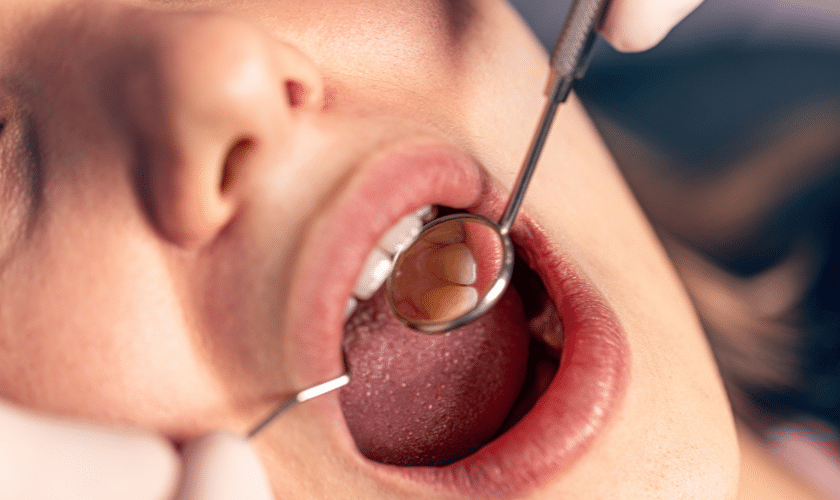
Oral infections can be troublesome, affecting daily life and overall well-being. These infections often start with subtle symptoms but can escalate if left untreated. Understanding the types, causes, and signs of oral infections helps in early detection and effective treatment.
Types of Oral Infections
Oral infections come in various forms, each with distinct characteristics:
- Gingivitis: This mild gum disease causes inflammation, redness, and bleeding gums.
- Periodontitis: Advanced gum disease leading to tissue damage and tooth loss.
- Oral Thrush: A fungal infection that manifests as white patches in the mouth.
- Herpes Simplex Virus (HSV): Causes painful sores and blisters on the lips and mouth.
- Dental Abscess: A pus-filled pocket in a tooth or the gum, causing severe pain and swelling.
Causes of Oral Infections
These infections can result from various factors:
- Poor Oral Hygiene: Inadequate brushing and flossing enable bacteria to thrive.
- Weakened Immune System: Conditions like diabetes or HIV/AIDS increase vulnerability.
- Smoking and Tobacco Use: These habits can damage gum tissue and reduce immunity.
- Dry Mouth: Reduced saliva production can lead to bacterial overgrowth.
- Diet: High sugar intake can contribute to bacterial growth and infection.
Recognizing Signs and Symptoms
Identifying the early signs of these infections is crucial for timely treatment. Here are the typical signs to watch for:
Gum-Related Symptoms
- Red, Swollen Gums: Inflammation and redness indicate gingivitis or periodontitis.
- Bleeding Gums: Noticing blood while brushing or flossing is a warning sign.
- Receding Gums: Gums pulling away from teeth can expose roots and cause sensitivity.
- Persistent Bad Breath: Chronic halitosis may suggest gum disease.
Tooth-Related Symptoms
- Toothache: Persistent pain could indicate an abscess or severe decay.
- Sensitivity: Increased sensitivity to hot or cold foods might be a sign of infection.
- Loose Teeth: Advanced periodontitis can weaken teeth, causing them to become loose.
General Symptoms
- Mouth Sores: Painful ulcers or sores may indicate HSV or other infections.
- White Patches: Oral thrush presents as creamy white lesions on the tongue or inner cheeks.
- Swollen Jaw: Swelling in the jaw or face can signal a dental abscess.
Effective Treatment Options
Treating oral infections promptly can prevent complications and ensure optimal oral health. Here’s a comprehensive approach to treatment:
Professional Dental Care
- Dental Cleaning: Regular cleanings remove plaque and tartar, preventing infections.
- Scaling and Root Planing: Deep cleaning to treat periodontitis and remove bacteria.
- Root Canal Therapy: Treats infected tooth pulp, preserving the tooth structure.
- Antibiotics: Prescribed to combat bacterial infections, especially in abscess cases.
Home Remedies and Self-Care
- Good Oral Hygiene: Brush twice daily and floss to maintain a clean mouth.
- Salt Water Rinse: Gargling with warm salt water can reduce inflammation and kill bacteria.
- Antiseptic Mouthwash: Helps reduce bacterial load and freshens breath.
- Pain Relief: Over-the-counter pain relievers can manage discomfort from infections.
Lifestyle Changes
- Quit Smoking: Stopping tobacco use can significantly improve gum health.
- Healthy Diet: A balanced diet with limited sugar intake supports oral health.
- Stay Hydrated: Stay well-hydrated to avoid dry mouth and promote saliva production.
Preventive Measures
Preventing oral infections is more effective than treating them. Adopting these habits can protect your mouth from infections:
Regular Dental Visits
Schedule regular check-ups and cleanings with your dentist. These visits help detect issues early and keep your oral health in check.
Proper Oral Hygiene
Brush your teeth at least twice a day using fluoride toothpaste, and floss daily to eliminate food particles and plaque between your teeth.
Healthy Lifestyle Choices
- Avoid Sugary Foods: Reduce sugar intake to lower the risk of cavities and infections.
- Stay Hydrated: Keep your mouth moist by drinking water throughout the day.
- Balanced Diet: Eat plenty of fruits, vegetables, and whole grains for overall health.
Protect Your Mouth
Wear a mouthguard during sports to prevent injuries that can lead to infections. Avoid sharing utensils, toothbrushes, or other items that contact your mouth.
When to Seek Professional Help
Recognizing when to seek professional dental care is crucial for managing these infections. Here are scenarios that warrant a visit to the dentist:
Persistent Symptoms
If you experience persistent symptoms like pain, swelling, or bleeding gums, consult your dentist promptly. These could indicate a serious infection requiring professional treatment.
Severe Pain or Swelling
Severe pain or swelling in the jaw or face suggests a dental abscess. Immediate dental attention is necessary to prevent complications.
Difficulty Swallowing or Breathing
Difficulty swallowing or breathing due to oral infection symptoms is an emergency. Seek urgent medical care to address these potentially life-threatening issues.
Regular Check-Ups
Even without symptoms, regular dental visits help prevent infections and maintain oral health. Your dentist can identify early signs of infection and provide preventive care.
Maintaining oral health is vital for overall well-being. By recognizing the signs and symptoms and seeking prompt treatment, you can prevent complications and enjoy a healthy smile. If you suspect an oral infection, don’t hesitate to reach out to a Los Angeles dentist for professional care and advice. Regular dental check-ups, good hygiene practices, and healthy lifestyle choices are your best defense against these infections.

